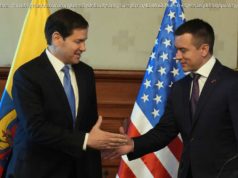Iraqi prime minister arrives in Mosul to declare victory over Islamic State.
Iraqi Prime Minister Haidar Abadi declared victory in Mosul on Sunday as government forces were on the cusp of defeating Islamic State militants bunkered in the remains of what was once the crown jewel of their so-called caliphate.
Donning a black Iraqi special forces uniform and flanked by military commanders, Abadi congratulated “the heroic fighters and the Iraqi people for achieving the great victory, ” according to a statement from his office released Sunday.
Pictures released by his office showed Abadi attending a military briefing while “issuing directives, ” according to the statement, that would “extend the victories and destroy the remnants of the defeated Daesh.” Islamic State is also known as Daesh, its Arabic acronym.
Abadi’s kudos, however, fell short of a “mission accomplished” speech marking the end of the nearly nine-month campaign to rout members of the extremist group from Mosul.
Only a few miles from the site of Abadi’s meetings, militants and fighters from Iraq’s Counter-Terrorism Service battled each other cheek by jowl in Mosul’s Old City district.
Coalition warplanes, meanwhile, struck the militants, now cornered in a tiny pocket a little more than 200 square yards with the Tigris river behind them, officers said. Dozens of fighters were killed, state media reported, as they tried to make their escape by swimming across.
Islamic State may be driven out of Mosul. The challenge will be keeping militants out for good. »
“The [Iraqi army’s] 16th division is on the other bank of the river and they shot them. They’ re so close that their bullets almost hit us, ” said Lt. Mohammad Saheb, a commander with the Counter-Terrorism Service whose battalion was leading the charge into the group’s last redoubt.
He and others spoke of a vicious resistance they expected by the estimated 60 extremists they believe will fight to the last man.
“They hide in tunnels, then run at you until they’ re within six or seven yards before they detonate their suicide vest. You barely have time to shoot them first. Otherwise, they’ ll get you, ” said Haidar Jabbar, a 24-year old deputy officer with CTS
“We’ ve had many battles against Daesh, but ask anyone, they’ ll tell you this is the hardest one.”
Saheb said that the skirmishes were so close that his men couldn’ t rely on airstrikes.
“We’ re only a few yards away. We have to use low-powered grenades and flash-bangs to flush them out, ” he said.
As he spoke, a coalition airstrike hit a nearby house, giving the ground a powerful shake and showering Saheb with debris.
“We didn’t even need loudspeakers when we were ordering them to come out and surrender, ” said Lt. Col. Ali Husseini. “They’ re in the next room, right across the wall.”
The Islamic State fighters have also intensified their use of improvised explosive devices, a signature tactic that the group had used to powerful effect in other places, such as Ramadi, but which it had thus far employed sparingly in Mosul.
“Every day we see new things. The other day they had booby-trapped an ammunition box, lacing it to two other explosives to kill anyone who opened it up, ” said Lt. Col. Said Badr Kathem, a demolitions expert, in an interview near the frontline.
“They put five bombs in a field hospital area alone.”
Kathem said the group had also begun to deploy female suicide bombers, hiding them among civilians fleeing the violence.
Islamic State’s defeat in Mosul represents the harshest blow yet to the group. But it is also a moment of redemption for Iraq’s security forces.
When the militants first blitzed into the city more than three years ago, government forces all but collapsed. Tens of thousands of soldiers shed their uniforms and ran for their lives, abandoning millions of dollars’ worth of U. S. military hardware.
A month later, Islamic State leader Abu Bakr Baghdadi declared himself the ruler of what he described as a caliphate whose area once covered a third of Iraq as well as Syria.
In Mosul’s eastern half (liberated in January and where life has largely returned to normal) , Abadi glad-handed his way through crowds of civilians who greeted him with cheers while raising their smartphone cameras to commemorate the moment. Revelers honked horns and waved large Iraqi flags from the windows of cars snarled in the traffic behind his convoy.
But in west Mosul there seemed to be less appetite for cheer. The dislodging of Islamic State from this half of the city, with its older buildings and narrower walkways, has come at a high price. Entire neighborhoods have been reduced to a post-apocalyptic landscape of ravaged masonry and crumpled vehicles. The sickly smell of decomposition is omnipresent.
The costs to rebuild the city, the U. N says, will run into the billions, and a full reckoning of the dead will take months while civil defense crews clear the rubble.
Meanwhile, Islamic State, many say, is defeated but not vanquished, not just in other parts of Iraq but here in Mosul. Residents speak of sleeper cells, and of former collaborators with the group who still walk among them.
Many soldiers said they expect to face the extremists in Mosul once more.
“I fought in this city from 2004 to 2009, from 2012 to 2013 and from 2016 till now, ” said Husseini, the commander, a thin smile on his face as he rested near the frontline.
“Daesh will come back. Maybe for now they’ re done, but they’ ll be back. Soon.”
s state TV says the country’s prime minister has arrived in Mosul to declare victory over the Islamic State group in the more than eight-month old operation to drive the militants from the city.
Bulos is a special correspondent.
UPDATES:
1: 10 p.m.: This article was updated throughout with Times reporting.
This article was originally published at 6: 05 a.m.






